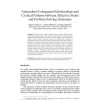Free Online Productivity Tools
i2Speak
i2Symbol
i2OCR
iTex2Img
iWeb2Print
iWeb2Shot
i2Type
iPdf2Split
iPdf2Merge
i2Bopomofo
i2Arabic
i2Style
i2Image
i2PDF
iLatex2Rtf
Sci2ools
110
click to vote
AIED
2009
Springer
2009
Springer
Antecedent-Consequent Relationships and Cyclical Patterns between Affective States and Problem Solving Outcomes
We explored the complex interplay between students' affective states and problem solving outcomes. We conducted a study where 41 students solved 28 analytical reasoning problems from the Law School Admission Test. Participants viewed videos of their interaction history and judged their emotions at theoretically relevant points in the problem solving session (after new problem is displayed, in the midst of problem solving, after feedback is received). We explore excitatory and inhibitory relationships between the affective states and problem solving outcomes (i.e. success or failure, and associated positive or negative feedback). We isolate affective states that are consequences of outcomes and associated feedback as well as affective states that are antecedents of positive or negative outcomes. Follow-up analyses focused on cyclical patterns that incorporate complex relationships between the affective states and problem solving outcomes. Implications of our results for affect-sens...
Affective States | AIED 2009 | Artificial Intelligence | Problem Solving | Problem Solving Outcomes |
| Added | 12 Aug 2010 |
| Updated | 12 Aug 2010 |
| Type | Conference |
| Year | 2009 |
| Where | AIED |
| Authors | Sidney K. D'Mello, Natalie K. Person, Blair Lehman |
Comments (0)

